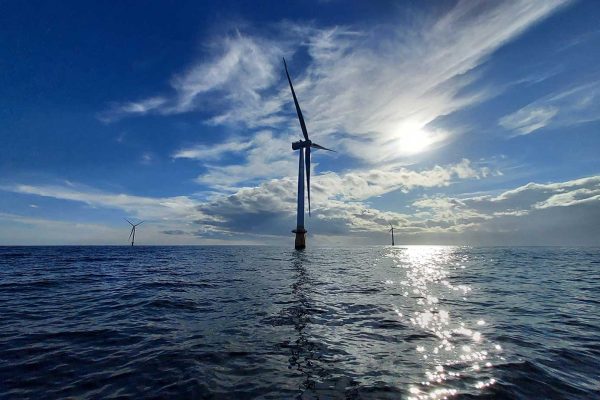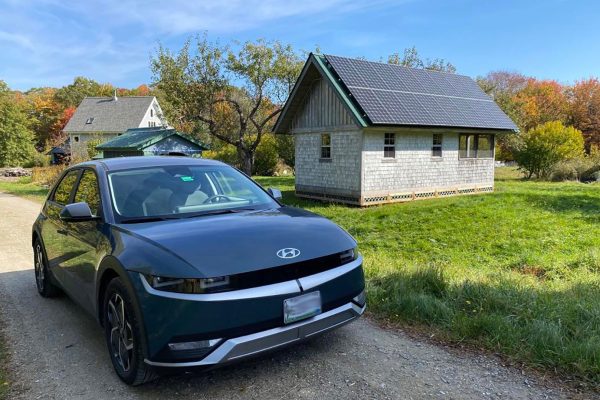Here’s how the Trump Administration’s attacks on American-made clean energy will make electricity in Maine more expensive and less reliable:

Offshore wind turbine, photo by JShapiro/NRCM
There are a lot of actions on energy and the environment being taken by the Trump Administration these days, many of which will have real consequences for Maine people, local businesses, and our communities.
Here, we’ll break down how proposals from the Trump Administration and Congressional leaders to double down on fossil fuels while undermining progress on American-made clean energy will impact electricity prices and grid reliability.
Most of Maine is part of the integrated New England electric grid. The majority of our electricity comes from fossil fuel-fired power plants, mostly fossil gas, sometimes known as natural gas. Fossil gas prices often swing wildly, making this dependence on gas the primary driver of high electricity bills in recent years.
That’s why we work so hard on building Maine-made renewable resources like wind, solar, and battery storage, and are now laying the groundwork for future investments in offshore wind. Homegrown clean energy is our practical path to affordable, reliable, clean energy long term.
Several new studies have made clear that the Trump Administration’s new policies to slam the brakes on offshore wind, slow permitting of American-made clean energy, unwind investments in new clean energy jobs, and loosen protections from toxic air pollution will undermine this progress. They will also likely raise your electric rates and threaten grid reliability.
Benefits of Homegrown Clean Energy
Federal funding made possible thanks to the Inflation Reduction Act (IRA) and Bipartisan Infrastructure Law (BIL) has already brought $2.2 billion in investment to Maine.
These programs have helped deliver more than $20 million per year to electricity customers for the past 10 years, not to mention the jobs they’ve helped create. That’s because renewable energy has no fuel costs and is cheap to operate. This means that more expensive gas and oil plants run less often, which saves money.
Repealing Federal Clean Energy Policies Harms Affordability and Reliability
Rolling back clean energy policies previously approved by Congress will slow the adoption of lower-cost clean energy sources, leaving expensive fossil fuel power plants online, with all of us paying the bills. One recent study estimated repealing the IRA clean energy tax credits would raise rates in New England by 17%.
Another set of studies confirmed that repealing IRA clean energy policies would raise prices and predict grid reliability would be a potential casualty of the Trump Administration’s energy choices.
Because electricity demand is rising for the first time in several decades, the best way to meet that demand is with new, American-made clean energy projects already in the planning stage. Building fossil fuel plants to meet this need would take too long and would risk having enough reliable power online when we need it.
In New England, building offshore wind would boost both affordability and reliability. Despite this, it is a particular target of the Trump Administration. New England’s Grid Operator testified to Congress this week: “New England has been counting on offshore wind as a major new source of energy, and our studies have shown substantial reliability benefits of offshore wind.”
Clean Energy Protects Maine from High Costs and Political Winds

Electric car and solar panels, by Judy Berk
The Administration’s chaotic approach to tariffs on Canada also increases uncertainty and risk, which could contribute to higher energy prices for Mainers on things like gasoline and heating oil in addition to electricity. Residents of Aroostook County, an area that is tied to Canada’s electric grid, could be especially vulnerable.
Maine sends more than $4 billion every year to buy out-of-state oil and gas—that’s about $500,000 per hour on average.
As long as we are dependent on these fossil fuels for heating, transportation, and generating electricity, Maine families and businesses will always be subject to high and unstable energy costs—which impact low-income Mainers the most.
Clean energy resources are now the cheapest and fastest way to add new electricity to the grid. Heat pumps, batteries, and electric vehicles deliver real freedom and energy independence because they can be powered by Maine-made renewable energy projects, insulating Mainers from the decisions of politicians from out of state who don’t have our best interests in mind.
The Natural Resources Council of Maine will keep working with residents, businesses, and communities across all 16 counties to deliver on the state’s goal of responsibly developing more homegrown clean energy sources so we can stabilize electricity prices and become more energy independent.
—Jack Shapiro, NRCM Climate & Clean Energy Director










Leave a Reply